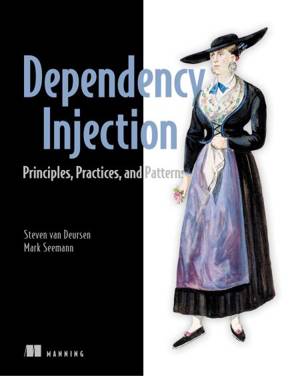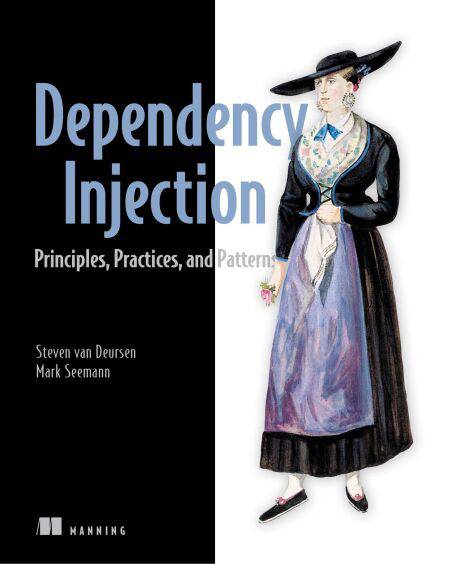
Door een staking bij bpost kan je online bestelling op dit moment iets langer onderweg zijn dan voorzien. Dringend iets nodig? Onze winkels ontvangen jou met open armen!
- Afhalen na 1 uur in een winkel met voorraad
- Gratis thuislevering in België vanaf € 30
- Ruim aanbod met 7 miljoen producten
Door een staking bij bpost kan je online bestelling op dit moment iets langer onderweg zijn dan voorzien. Dringend iets nodig? Onze winkels ontvangen jou met open armen!
- Afhalen na 1 uur in een winkel met voorraad
- Gratis thuislevering in België vanaf € 30
- Ruim aanbod met 7 miljoen producten
Zoeken
Dependency Injection Principles, Practices, and Patterns E-BOOK
Mark Seemann, Steven van Deursen
E-book | Engels
€ 51,44
+ 51 punten
Uitvoering
Omschrijving
Summary
Dependency Injection Principles, Practices, and Patterns teaches you to use DI to reduce hard-coded dependencies between application components. You'll start by learning what DI is and what types of applications will benefit from it. Then, you'll work through concrete scenarios using C# and the .NET framework to implement DI in your own projects. As you dive into the thoroughly-explained examples, you'll develop a foundation you can apply to any of the many DI libraries for .NET and .NET Core.
Purchase of the print book includes a free eBook in PDF, Kindle, and ePub formats from Manning Publications.
About the Technology
Dependency Injection (DI) is a great way to reduce tight coupling between software components. Instead of hard-coding dependencies, such as specifying a database driver, you make those connections through a third party. Central to application frameworks like ASP.NET Core, DI enables you to better manage changes and other complexity in your software.
About the Book
Dependency Injection Principles, Practices, and Patterns is a revised and expanded edition of the bestselling classic Dependency Injection in .NET. It teaches you DI from the ground up, featuring relevant examples, patterns, and anti-patterns for creating loosely coupled, well-structured applications. The well-annotated code and diagrams use C# examples to illustrate principles that work flawlessly with modern object-oriented languages and DI libraries.
What's Inside
Refactoring existing code into loosely coupled code DI techniques that work with statically typed OO languages Integration with common .NET frameworks Updated examples illustrating DI in .NET Core
About the Reader
For intermediate OO developers.
About the Authors
Mark Seemann is a programmer, software architect, and speaker who has been working with software since 1995, including six years with Microsoft. Steven van Deursen is a seasoned .NET developer and architect, and the author and maintainer of the Simple Injector DI library.
Table of Contents
PART 1 Putting Dependency Injection on the map The basics of Dependency Injection: What, why, and how Writing tightly coupled code Writing loosely coupled code PART 2 Catalog DI patterns DI anti-patterns Code smells PART 3 Pure DI Application composition Object lifetime Interception Aspect-Oriented Programming by design Tool-based Aspect-Oriented Programming PART 4 DI Containers DI Container introduction The Autofac DI Container The Simple Injector DI Container The Microsoft.Extensions.DependencyInjection DI Container
Dependency Injection Principles, Practices, and Patterns teaches you to use DI to reduce hard-coded dependencies between application components. You'll start by learning what DI is and what types of applications will benefit from it. Then, you'll work through concrete scenarios using C# and the .NET framework to implement DI in your own projects. As you dive into the thoroughly-explained examples, you'll develop a foundation you can apply to any of the many DI libraries for .NET and .NET Core.
Purchase of the print book includes a free eBook in PDF, Kindle, and ePub formats from Manning Publications.
About the Technology
Dependency Injection (DI) is a great way to reduce tight coupling between software components. Instead of hard-coding dependencies, such as specifying a database driver, you make those connections through a third party. Central to application frameworks like ASP.NET Core, DI enables you to better manage changes and other complexity in your software.
About the Book
Dependency Injection Principles, Practices, and Patterns is a revised and expanded edition of the bestselling classic Dependency Injection in .NET. It teaches you DI from the ground up, featuring relevant examples, patterns, and anti-patterns for creating loosely coupled, well-structured applications. The well-annotated code and diagrams use C# examples to illustrate principles that work flawlessly with modern object-oriented languages and DI libraries.
What's Inside
Refactoring existing code into loosely coupled code DI techniques that work with statically typed OO languages Integration with common .NET frameworks Updated examples illustrating DI in .NET Core
About the Reader
For intermediate OO developers.
About the Authors
Mark Seemann is a programmer, software architect, and speaker who has been working with software since 1995, including six years with Microsoft. Steven van Deursen is a seasoned .NET developer and architect, and the author and maintainer of the Simple Injector DI library.
Table of Contents
PART 1 Putting Dependency Injection on the map The basics of Dependency Injection: What, why, and how Writing tightly coupled code Writing loosely coupled code PART 2 Catalog DI patterns DI anti-patterns Code smells PART 3 Pure DI Application composition Object lifetime Interception Aspect-Oriented Programming by design Tool-based Aspect-Oriented Programming PART 4 DI Containers DI Container introduction The Autofac DI Container The Simple Injector DI Container The Microsoft.Extensions.DependencyInjection DI Container
Specificaties
Betrokkenen
- Auteur(s):
- Uitgeverij:
Inhoud
- Aantal bladzijden:
- 552
- Taal:
- Engels
Eigenschappen
- Productcode (EAN):
- 9781638357100
- Verschijningsdatum:
- 5/03/2019
- Uitvoering:
- E-book
- Beveiligd met:
- Adobe DRM
- Formaat:
- ePub

Alleen bij Standaard Boekhandel
+ 51 punten op je klantenkaart van Standaard Boekhandel
Beoordelingen
We publiceren alleen reviews die voldoen aan de voorwaarden voor reviews. Bekijk onze voorwaarden voor reviews.











